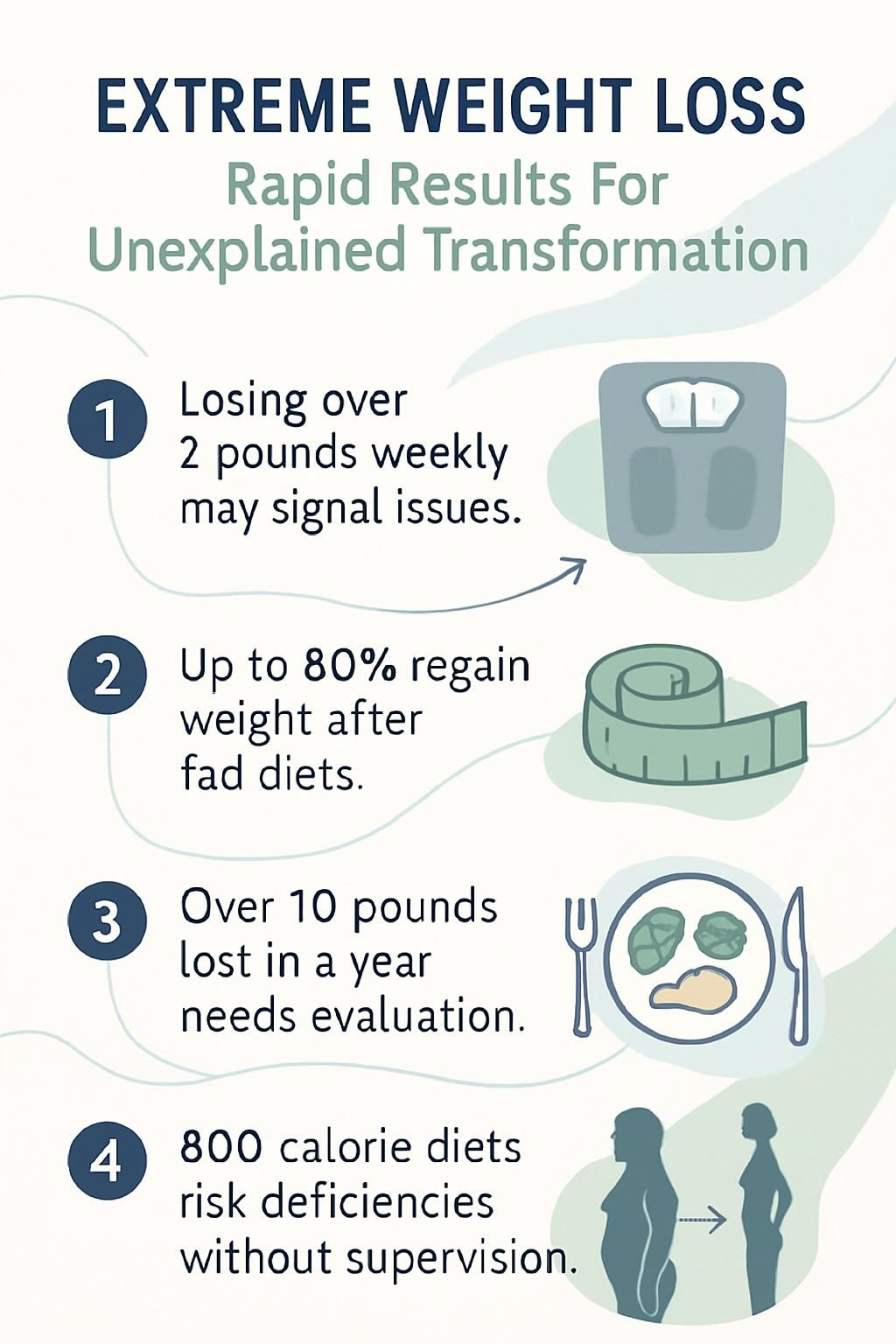Extreme Weight Loss: Rapid Results For Unexplained Transformation
Our Nutrition Assistant AI Suite will transform your body. You will lose fat, get toned, and build muscle. Gain confidence and optimal health.
Rapid changes on the scale can feel scary, especially if they happen without trying. If you see extreme weight loss or lose weight quickly, you need clear facts and a safe plan.
Rapid weight loss usually means dropping more than 2 pounds a week for several weeks. That speed can signal medical problems or harsh dieting. This guide explains causes, safe methods such as very low-calorie diets and intermittent fasting, how to track progress, and when to call your doctor. You will also learn practical steps that help you protect your health while working through obesity or an unexplained weight loss.
Key Takeaways
- Rapid weight loss, more than 2 pounds per week for several weeks, can point to conditions such as diabetes, thyroid disease, or cancer. Seek professional care if it is unintentional (CDC and NIH guidance).
- Extreme diets, including VLCDs at about 800 calories per day and strict fasting schedules, can work fast but raise risks like muscle loss, nutrient gaps, and hormone changes if unsupervised.
- Up to 80 percent of people regain weight after fad diets. Gradual loss, about 0.5 to 1 pound per week, is more likely to last.
- High-intensity interval training can lift metabolism and fitness, but pairing it with severe calorie restriction raises injury and fatigue risk. Medical clearance is smart.
- Losing more than 10 pounds, or 5 percent of body weight, in a year without trying needs a medical evaluation to rule out serious causes.

Understanding Extreme Weight Loss

Extreme weight loss can be startling. You might wonder if a low-calorie diet, an intense workout plan, or a hidden health condition is behind the rapid change.
What is extreme weight loss?
Extreme weight loss means losing more than 2 pounds, about 0.9 kilograms, week after week. It can follow strict calorie restriction, quick shifts in eating habits, or heavy exercise combined with low intake.
Fast loss is rarely just fat. Water, muscle, and even bone density can drop too. Reality shows often highlight dramatic changes in short periods, which can shape unrealistic goals.
Some people with obesity use supervised programs for medical reasons, such as preparing for surgery. Even then, doctors warn about risks like muscle loss, low energy, and nutrient deficiencies. The pull of quick fixes is strong, yet most bodies do better with steady changes and enough food to fuel daily life.
What are common myths about rapid weight loss?
Big, fast drops on the scale do not prove a plan is better. Health professionals advise slower goals for lasting change.
Television transformations can set expectations that exceed safe medical guidelines. Many fad diets use severe cuts, which can cause a quick drop but do not teach long-term habits. Exercise helps, but deep calorie cuts, not movement alone, usually drive rapid decline in weight. A realistic pace is about 0.5 to 1 pound per week for most adults.
Fad diets rarely build lasting health. They often lead to regain and frustration.
Investigating Causes of Extreme Weight Loss
Extreme weight loss has many causes. Finding the reason early can protect your health and guide treatment.
What medical conditions cause rapid weight loss?
Unplanned loss can be a warning sign. These conditions often play a role:
- Diabetes can cause fast loss, especially type 1, because the body cannot use glucose well and burns fat and muscle for fuel. Poorly controlled type 2 can do this too.
- Thyroid problems such as hyperthyroidism raise metabolism and cause unintended loss. Anxiety, sweating, and high blood pressure can appear as well.
- Several cancers, including pancreatic or gastrointestinal cancers, can trigger loss due to metabolic changes and lower appetite.
- Digestive diseases like Crohn’s disease, ulcerative colitis, and celiac disease reduce nutrient absorption, leading to steady decline.
- Mental health conditions, such as depression and eating disorders like anorexia nervosa, often change appetite and eating patterns.
- Chronic infections, including tuberculosis or HIV, raise calorie needs and may reduce appetite.
- Dementia can cause missed meals or reduced interest in food, especially in older adults.
- Advanced heart or lung disease, such as severe heart failure or COPD, can increase calorie use while limiting activity.
My grandmother lost nearly fifteen pounds before a thyroid test confirmed the issue. If you lose 10 pounds or more without trying, call your doctor.
How do extreme diets and calorie restriction affect weight loss?
Very low-calorie diets and deep restriction can produce 3 to 5 pounds per week at first. Many plans set daily calories near 800. Low carbohydrate intake can shift the body into ketosis, which uses fat for fuel.
Hormones adjust after the early drop, so loss slows. With extreme deficits, the body breaks down muscle and water along with fat. Deficiencies in vitamins, minerals, and protein become more likely without medical supervision.
Problems like low blood sugar and lower bone density can follow long restriction. Some programs use VLCDs briefly before bariatric surgery under close care because the risks are real.
Going very low on calories without guidance can cost you more than fat. Muscle, mood, and health can suffer.
What psychological factors drive rapid weight loss?
Body image pressure and strong emotions often push fast changes. Reality shows can make speed look normal and raise stress.
Competition, public weigh-ins, and high standards can fuel extreme choices. Stress and low self-esteem may increase the urge to restrict food quickly. Without counseling, irritability, anxiety, and fatigue tend to rise, which can derail progress and health.
Popular Methods for Extreme Weight Loss
Many methods promise rapid results. Some rely on strict intake limits, others on timing meals, and some combine both.
How do Very Low-Calorie Diets (VLCD) work?
VLCDs limit intake to about 800 calories daily. Most plans use meal replacements, such as shakes, soups, bars, or powdered formulas. This large deficit can lead to 3 to 5 pounds per week at the start.
People with obesity sometimes choose VLCDs under a clinician’s care for surgery prep or to address urgent health risks. Close supervision is critical due to muscle loss, dehydration, and nutrient gaps. Short-term use is standard, usually not more than 12 weeks.
When I tried a supervised plan, hunger rose quickly, and my energy dipped. A multivitamin and careful monitoring helped keep me stable.
What are the benefits and drawbacks of Intermittent Fasting?
Intermittent fasting limits eating to set days or hours. The 5:2 plan uses two lower-calorie days per week and five days of regular eating.
| Benefits of Intermittent Fasting | Drawbacks of Intermittent Fasting |
|---|---|
|
|
What are the pros and cons of Time-Restricted Eating?
Time-restricted eating limits meals to a daily window, such as 10 AM to 6 PM in the 16:8 method.
| Pros | Cons |
|---|---|
|
|
How effective are fad diets for extreme weight loss?
Fad diets often cut calories hard or remove food groups. Quick scale drops usually include water and muscle along with fat. Research shows that most people regain much of the weight after stopping these strict rules.
Many plans fall short on dietary fiber, healthy fats, and key micronutrients. They can reduce muscle mass and raise risks such as dehydration or gallstones. Health groups suggest aiming for 0.5 to 1 pound per week to protect muscle and heart health.
I once tried a trendy animal-heavy menu. I felt tired, got irritable, and regained every pound within a month after quitting the plan.
The Role of Exercise in Extreme Weight Loss
Exercise supports safe fat loss and overall health. It can help with cholesterol levels, blood pressure, and mood when matched with a healthy diet.
What are the benefits of High-Intensity Interval Training (HIIT)?
HIIT uses short bursts of hard effort with rest periods. It burns calories fast and improves fitness in less time. Studies show HIIT can raise HDL, the so-called good cholesterol, and lower LDL, the less healthy type.
Pair HIIT with enough food and protein for recovery. If you plan sharp calorie cuts, get medical clearance first, since fatigue and injury risk can rise. Trainer Chris Powell has used intervals for quick fitness gains in televised programs.
Why is strength training important for weight loss?
Strength training protects lean muscle while you lose fat. Without it, the body often breaks down muscle for energy during rapid loss.
Muscle burns more calories at rest than fat. Losing it slows your daily burn and makes long-term control harder. Research shows people who lift while dieting keep more lean tissue. During my college wrestling years, I felt weak on a strict cut until I added regular lifting sessions back in.
How effective are cardio workouts for losing weight quickly?
Cardio, like running or cycling, can burn 300 to 600 calories per hour depending on pace and body size. It supports loss, but it works best when intake is not extremely low.
During very low intake, tough cardio becomes hard to sustain. Most experts suggest moderate cardio once you reach a steady, safe calorie level. People on certain prescriptions or with conditions such as Parkinson’s should ask a clinician before starting.
Benefits Associated with Extreme Weight Loss
Fast changes can be visible and motivating. People with obesity might also see health markers improve when body fat drops.
What rapid visible changes can occur with extreme weight loss?
Clothes can loosen quickly, and your face may look slimmer. Reality programs have documented large drops in short periods, sometimes dozens of pounds in a few months.
Much of the early shift can be water with some fat. This can lift motivation, but it tends to fade without durable habits. If loss is unplanned, call a doctor to check for medical causes.
How does extreme weight loss benefit obese individuals?
For some people with obesity, rapid loss can lower blood sugar, improve cholesterol, and reduce high blood pressure. Clinicians sometimes use VLCDs under supervision before surgery or to help manage severe diabetes. These steps can lower risk while a long-term plan is built.
My cousin used a supervised VLCD before knee surgery. Her swelling went down, and her energy rose within weeks. Close follow-up kept her safe and on track.
Risks of Extreme Weight Loss
Fast loss stresses the body. Before starting any extreme plan, learn the trade-offs so you can protect your health.
How does extreme weight loss impact muscle mass?
With sharp calorie cuts, the body often breaks down muscle along with fat. VLCDs can speed this loss if you skip strength work and adequate protein.
Less muscle slows metabolism and makes regain more likely. Some studies show as much as a quarter of total loss can be lean mass during crash diets. Regular resistance training reduces that risk.
What nutritional risks and deficiencies can arise?
Very strict diets raise the chance of missing key nutrients. Common issues include:
- Dehydration, since early loss often includes water.
- Vitamin and mineral gaps, especially vitamin D, vitamin B12, calcium, iron, and potassium.
- Symptoms like fatigue, constipation, diarrhea, or nausea.
- Too little protein, which can speed muscle loss and slow metabolism.
- Higher risk of gallstones or gout with rapid drops in weight.
- Lower immune defenses, making infections harder to fight.
- Hair thinning or brittle nails from low zinc or biotin intake.
- My crash plan in high school left me dizzy and tired. A lab test showed low iron, and my doctor adjusted my meals.
- Work with a clinician if you attempt strict methods. Early checks can prevent serious problems.
What hormonal changes and imbalances can occur?
Poor intake during rapid loss disrupts hormones. Insulin control may worsen, and thyroid output can slow as the body saves energy. Testosterone can drop in both men and women with severe cuts or heavy training without fuel.
These shifts increase hunger and can stall fat loss. They also raise the chance of regaining weight after the diet ends. Mood swings, fatigue, and focus problems are common until hormone levels stabilize.
What are the psychological and emotional effects?
Fast loss often leads to fatigue, irritability, and mood shifts. The body and brain react to low energy and routine changes.
Depression and anxiety can rise when pressure is high. Without mental health support, coping gets harder. In my own rapid cut, isolation and worry grew until I talked with a counselor, which made daily choices easier.
Recognizing Unexplained Weight Loss: When to See a Doctor
Unexplained weight loss can point to a serious condition. Early evaluation helps you get answers and treatment.
What symptoms require medical attention for unexplained weight loss?
Call your clinician if you lose more than 10 pounds, or over 5 percent of body weight, in a year without trying, especially with these signs:
- Ongoing fatigue or weakness that rest does not fix.
- Sudden loss of appetite or trouble eating for several days.
- Fever, night sweats, or chills.
- Abdominal pain, severe diarrhea, vomiting, or swallowing problems.
- New belly swelling or painful lumps under the skin.
- New mood changes, depression, memory problems, or confusion.
- Bleeding from the nose, gums, or digestive tract, or coughing up blood.
- Shortness of breath, chest pain, new cough, or heart palpitations.
- In children and teens, any notable unplanned loss needs urgent care.
- Older adults and people who are pregnant need prompt evaluation for any sudden loss.
If several of these show up with rapid, unexplained loss, seek care right away.
What common health issues cause unexplained weight loss?
Several conditions are frequently involved:
- Diabetes, often with thirst, frequent urination, and fatigue.
- Thyroid disorders, especially hyperthyroidism with a fast heartbeat or sweating.
- Cancer, including gastrointestinal cancers or lymphoma, due to changes in metabolism and appetite.
- Digestive diseases such as Crohn’s disease, celiac disease, and peptic ulcers.
- Chronic infections like tuberculosis or HIV.
- Mental health conditions such as depression or anxiety.
- Heart failure or chronic kidney disease, which can lead to muscle wasting.
- Medication side effects, including some antibiotics, thyroid drugs, chemotherapy, and stimulants.
Clinicians screen for these during the first evaluation. Early diagnosis often improves outcomes.
What steps are involved in medical diagnosis of weight loss?
A thorough workup helps find the cause:
- Review your weight history, timeline, diet, stress, and recent illness.
- Assess symptoms using a structured checklist.
- Physical exam, including checks for swollen lymph nodes or abdominal tenderness.
- Blood tests, such as a complete blood count, thyroid panel, glucose, and liver tests.
- Imaging, like an X-ray or ultrasound, if organ problems are suspected.
- Referrals to specialists, for example endocrinology or gastroenterology, when needed.
- Ongoing follow-up to confirm the cause and track recovery.
I lost ten pounds in two months without trying. My doctor used this exact process and found a thyroid issue.
Sustainable Alternatives to Extreme Weight Loss
Slow change protects health and keeps results. A steady plan can feel easier to live with day to day.
Why is gradual weight loss more beneficial?
Aim for about 0.5 to 1 pound per week. Research shows slow, steady loss is easier to maintain. It also reduces muscle and bone loss and keeps energy higher.
When I set smaller weekly goals, I stuck to the plan and felt less run down. The steady routine made it easier to live a normal life while improving health.
How can diet and exercise be combined effectively?
Choose meals with vegetables, whole grains, and lean protein. Limit added sugar and saturated fat. Reducing daily intake by 500 to 750 calories often yields one to two pounds of loss per week, according to CDC guidance.
Layer in movement you can keep. Try brisk walking most days and strength training twice weekly. If you manage emotional eating or have medical conditions, ask a clinician or dietitian for support. Group coaching kept me focused when motivation dipped.
What is the role of professional nutritional guidance?
Registered dietitians help you cut calories while meeting nutrient needs. They review your health history and adjust plans as your body responds.
If you consider a very low-calorie diet, medical supervision can catch problems like electrolyte changes or muscle loss. Expert coaching also improves the odds that you will keep the weight off.
Mental and Emotional Aspects of Weight Loss
Your mindset shapes daily choices. Building skills for stress, body image, and motivation can protect progress.
How can you deal with body image issues during weight loss?
Media images can set goals that are not realistic. Most people change more slowly than a highlight reel suggests.
Set health-based goals instead of chasing a look. Counseling or support groups can lift self-esteem and help you spot progress you might miss on the scale.
How to handle stress and emotional triggers related to weight?
Stress raises cortisol, which can push cravings for high-calorie foods. When pressure hits, swap snacking for deep breathing, a journal entry, or a short walk.
Support groups and counseling provide accountability and coping tools. People under public pressure, such as on television, often benefit from extra support to avoid risky behavior.
Why is counseling and support important during weight loss?
Motivational counseling helps during plateaus and tough weeks. One study reported that people who used counseling were more likely to keep weight off after one year than those who did not receive support.
In my experience, weekly meetings kept me steady. Counseling also addressed body image and old habits, which boosted both physical and emotional health.
Medical Interventions for Weight Loss
Medical options can help if lifestyle changes have not delivered enough progress. Always work with a licensed clinician.
What prescription weight loss medications are available?
Several prescription drugs can reduce appetite or block fat absorption. They must be used under medical supervision:
- Orlistat blocks about a quarter of dietary fat from being absorbed. Possible side effects include oily stools.
- Phentermine-topiramate lowers appetite. Trials show average losses near 10 percent of body weight in a year for some patients.
- Liraglutide is a daily injection that mimics a gut hormone to reduce hunger. Typical loss is 5 to 10 percent over several months.
- Naltrexone-bupropion targets brain pathways related to cravings and reward.
- Semaglutide is a weekly injection. Some studies show losses greater than 15 percent of body weight.
- Setmelanotide serves rare genetic forms of obesity and requires specialist care.
- These medicines work best with nutrition coaching, activity, and regular follow-up.
- Candidates often have obesity or weight-related conditions that need stronger treatment.
What are the benefits and risks of bariatric surgery?
Bariatric surgery can deliver major loss and health gains for people with severe obesity. Review both sides before choosing.
| Benefits | Risks |
|---|---|
|
|
During a support group visit, I saw how regular counseling and community improved confidence and follow-through. People who had support reported smoother recovery and steadier habits.
What structured weight loss programs exist?
Structured programs blend medical care, nutrition, and behavior change:
- Clinics led by medical teams provide check-ins and lab monitoring.
- VLCD programs use 800 calories or less for short periods with close supervision.
- Meal replacement plans simplify choices with pre-portioned shakes and bars.
- Medication programs add prescriptions when indicated and track responses.
- Bariatric surgery programs guide care before and after procedures.
- Intensive behavioral therapy focuses on skills and weekly counseling.
- Residential programs teach daily routines under constant supervision.
- Commercial options, such as Optifast, combine medical review with education.
- Insurance pathways may require regular visits and documented progress.
Partner with your provider to match a program to your goals and health needs.
Success Stories of Weight Loss Transformations
Real stories can inspire action. They also show the value of structure, patience, and support.
What are some inspiring real-life weight loss cases?
Television series have followed participants dropping large amounts over a year, sometimes more than 200 pounds. Celebrity guests have encouraged progress and offered motivation.
These stories show what hard work and supervision can do. They also highlight the need for safe methods and strong support systems.
What sustainable strategies lead to lasting weight loss?
Long-term success usually comes from simple habits done often. The most common patterns include steady diet changes, regular exercise, and ongoing support.
People who keep healthy foods on hand, such as frozen produce and lean proteins, report fewer slipups. Many meet with a dietitian or attend counseling for accountability. In recent program reports, small weekly actions reduced relapse and improved health markers.
Strategies for Maintaining Long-Term Weight Loss
Keeping weight off takes structure and feedback. The right tools help you spot small slips before they grow.
How to establish consistent healthy habits?
Create a routine for meals and movement. People who track food and activity often lose more than those who do not track.
Use a journal or a simple app to log choices. Join a group for accountability. Sharing goals once a week helped me keep a steady routine.
Watch for early warning signs, like skipping workouts or frequent high-calorie snacks. Weekly reviews can steady the course.
How can you avoid yo-yo dieting?
Choose slow loss, one to two pounds per week. Avoid extreme plans that are hard to keep. Build meals you enjoy and movement you can repeat.
A registered dietitian helped me move past the repeat-loss cycle. Tracking progress showed what worked, which made consistency easier.
What are effective methods for tracking weight loss progress?
Weigh yourself weekly and record it. Track meals, steps, workouts, and measurements around the waist, hips, and thighs. Smart scales that estimate body fat and muscle can add detail.
Schedule check-ins with a clinician to review blood pressure, heart rate, and labs. I kept before-and-after photos, which showed progress when the scale paused. Consistent tracking keeps motivation high and guides adjustments.
Conclusion
Extreme weight loss can bring rapid change, but it comes with trade-offs. If you choose fast methods, aim for medical supervision to limit risks like muscle loss, nutrient gaps, hormone shifts, and emotional strain.
Unexplained weight loss needs prompt medical care to rule out serious conditions. If your goal is to lose weight in a healthy way, steady habits, professional guidance, and smart tracking are the safest path. With patience and support, you can protect your health and still see meaningful results.
Medical disclaimer: This article is for education only and does not replace personalized advice. Speak with a licensed healthcare professional before starting any weight-loss plan or medication.
FAQs
1. What causes extreme weight loss with rapid results when the transformation is unexplained?
Extreme weight loss that happens quickly and without a clear reason may signal an underlying health issue such as thyroid disorders, diabetes, digestive diseases, or cancer. According to data from the Mayo Clinic, losing more than 5 percent of your body weight in six to twelve months without trying should prompt medical attention.
2. Are there risks linked to fast and unexplained weight reduction?
Rapid and unexplained weight reduction can lead to muscle wasting, weakened immunity, fatigue, dehydration, and nutrient deficiencies. A study published in The American Journal of Clinical Nutrition found that sudden drops in body mass often result in loss of lean tissue rather than fat.
3. How do doctors diagnose the cause behind unexpected extreme slimming?
Doctors review medical history; conduct physical exams; order blood tests for hormone levels; check organ function; use imaging like CT scans or ultrasounds if needed; and sometimes request stool studies or biopsies based on symptoms. These steps help identify possible illnesses causing drastic changes.
4. Can personal experience help recognize warning signs early?
Yes; noticing clothes fitting looser despite no change in diet or activity level can be a sign something is wrong. For example, one patient reported feeling tired all day while dropping ten pounds within two months even though eating habits stayed constant. This prompted her doctor visit which led to early diagnosis of a treatable condition.
Summary: Unexplained rapid slimming may indicate serious illness requiring prompt evaluation by healthcare professionals who use evidence-based methods for diagnosis and treatment planning. Early recognition through personal observation supports timely intervention for better outcomes.







